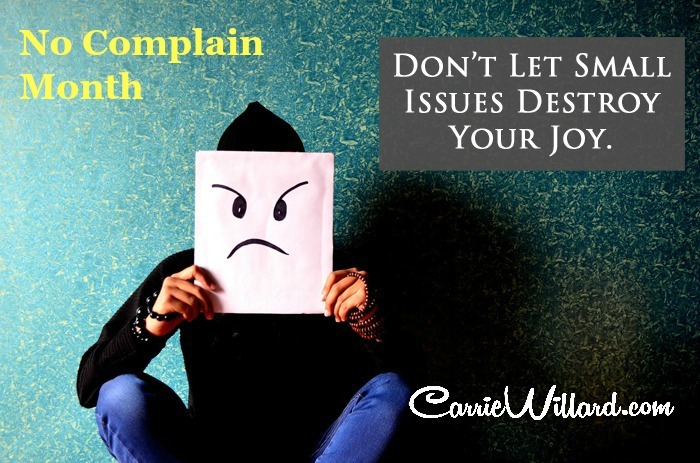A couple of months ago, I read this article about how complaining damages the brain.
An excerpt:
When we complain, our brains release stress hormones that harm neural connections in areas used for problem solving and other cognitive functions. This also happens when we listen to someone else moan and groan. “It’s as bad as secondhand smoke,” Gordon says. “It’s secondhand complaining.”
A half hour of complaining every day physically damages a person’s brain, according to research from Stanford University. Whether you’re the one griping or you’re the one listening, exposure to negativity peels back neurons in the hippocampus—the part of the brain used for problem solving and cognitive function.
I love monthly challenges of all kinds and have done many, some of which I’ve written about here. A month is long enough to change habits, but it isn’t long enough to be overwhelming if you don’t enjoy the challenge.
And it seems a natural part of my personality to want to tweak and improve things. Examining my life and ways of doing things instead of operating mindlessly, on autopilot – it’s fun for me.
But there was another important reason I wanted to do a No Complain Month.
As a wife and mother, I often feel like the customer service department of a small business. When things are going well, I rarely hear about it. But when anyone is unhappy, I’m the sounding board. It’s one of the more exhausting aspects of the job.
There have been days where I figuratively put my hands over my ears, lalalalala style, and told the complainer of the moment, “Mommy isn’t taking any more complaints. I only want to hear positive things for the rest of the day.”
As a mom, it’s obviously my job to help my children navigate difficult aspects of their lives, and I certainly want my husband to confide in me when he’s feeling overburdened.
But where is it written that I must be available 24/7/365 for everyone to offload the minor “gnat bites” of life? Especially when, according to research, doing so was making me stupider by the minute?
In addition, hubby and I felt that there was simply too much complaining in general in the house, and we wanted to work on creating a more positive tone.
Hubby and I talked about having a family No Complain Month. We held a family meeting to discuss it with the kids and set some easy ground rules (and a reward for the winner with the fewest complaints). They were:
No complaining. Pretty simple. A complaint, for us, was grumbling or fussing about something relatively minor (such as having to eat cauliflower at supper).
First world problems, if you will. Things that are better left unsaid. We made an exception for serious issues (physical pain or injury, serious relationship problems, injustice in the world, etc).
Observations are ok. Noticing and commenting on a reality (i.e., inclement weather that spoils your biking plans) isn’t a complaint unless it’s accompanied by a whiny tone. And, you could turn around an almost-complaint with this suggestion from the article:
USE THE “BUT-POSITIVE” TECHNIQUE
[…] “If you find yourself griping, add a ‘but’ and say something positive,” he says. For example, “I don’t like driving to work, but I’m thankful at least I can drive and I even have a job.”
My husband employed this technique many times.
I kept a simple log – a piece of paper with everyone’s name on it. When someone complained, they got a check mark. Almost-complaints saved with a “but-positive” didn’t count. Tattling was not forbidden, but self-reporting was also strongly encouraged. The person with the fewest marks at the end got to choose a fun family outing.
I think the exercise helped us all be more mindful in general, especially of our motives. Were we opening our mouths about something negative to get empathy and support from our loved ones? Nothing wrong with that, especially if the instances are few and far between.
Or, were we just in a crappy mood and not trying to solve our problems or turn our mood around? Not so nice. Gossip and a lack of gratitude also show up in complaints.
If you’re curious about the winner, it was me. The second place winner was the 14 year old boy. I think at least two members of the family were surprised by how many checks they got, because they both thought of themselves as mostly positive people.
The experiment was certainly interesting, and I would like to repeat it, at least privately.
I came across this interesting video, about how elegant women don’t complain, that you might enjoy. She recommends the “and” method (similar to the “but” method mentioned above) to turn a complaint around. And my kids love these “first world problems” YouTube videos. They certainly get the point across in a fun way that most of us are incredibly spoiled.
Is there someone in your life who complains a lot and drags you down? How do you help your kids when they get a complainypants attitude?

Leave a Reply